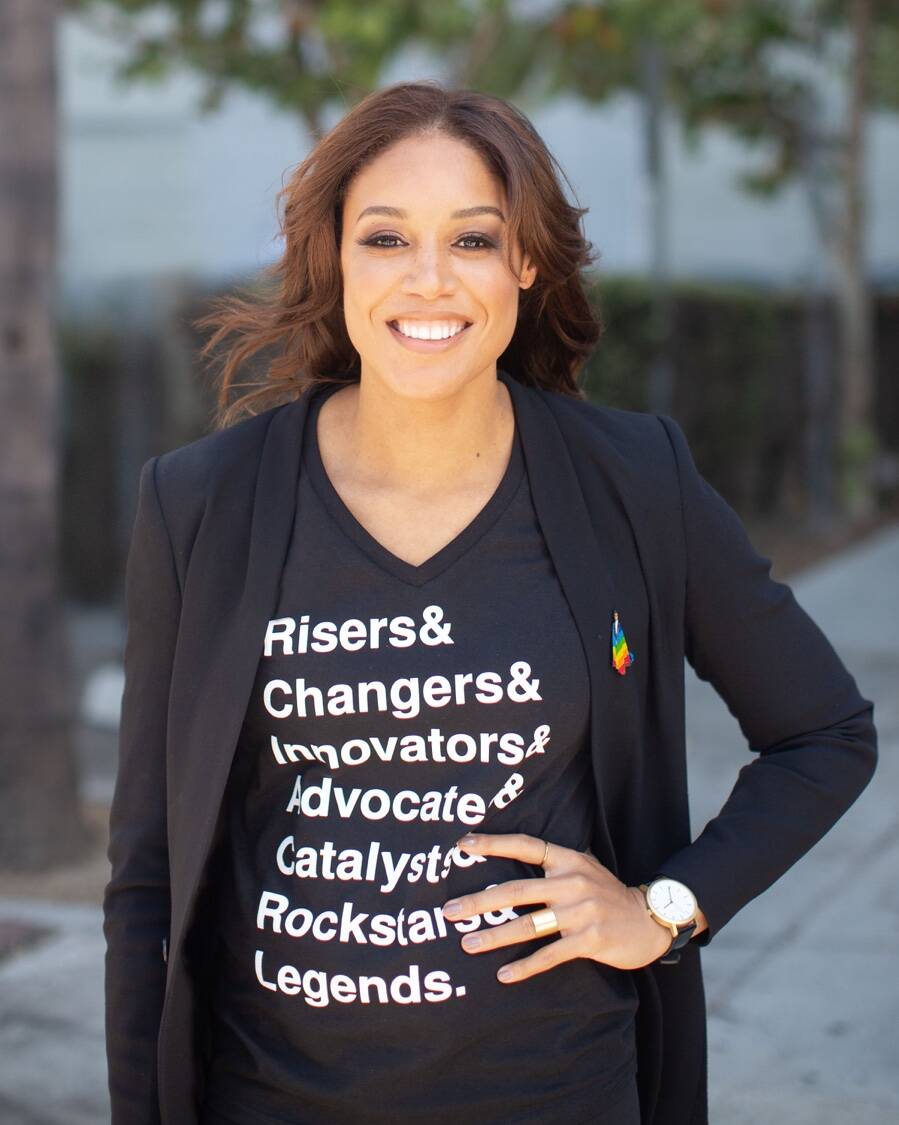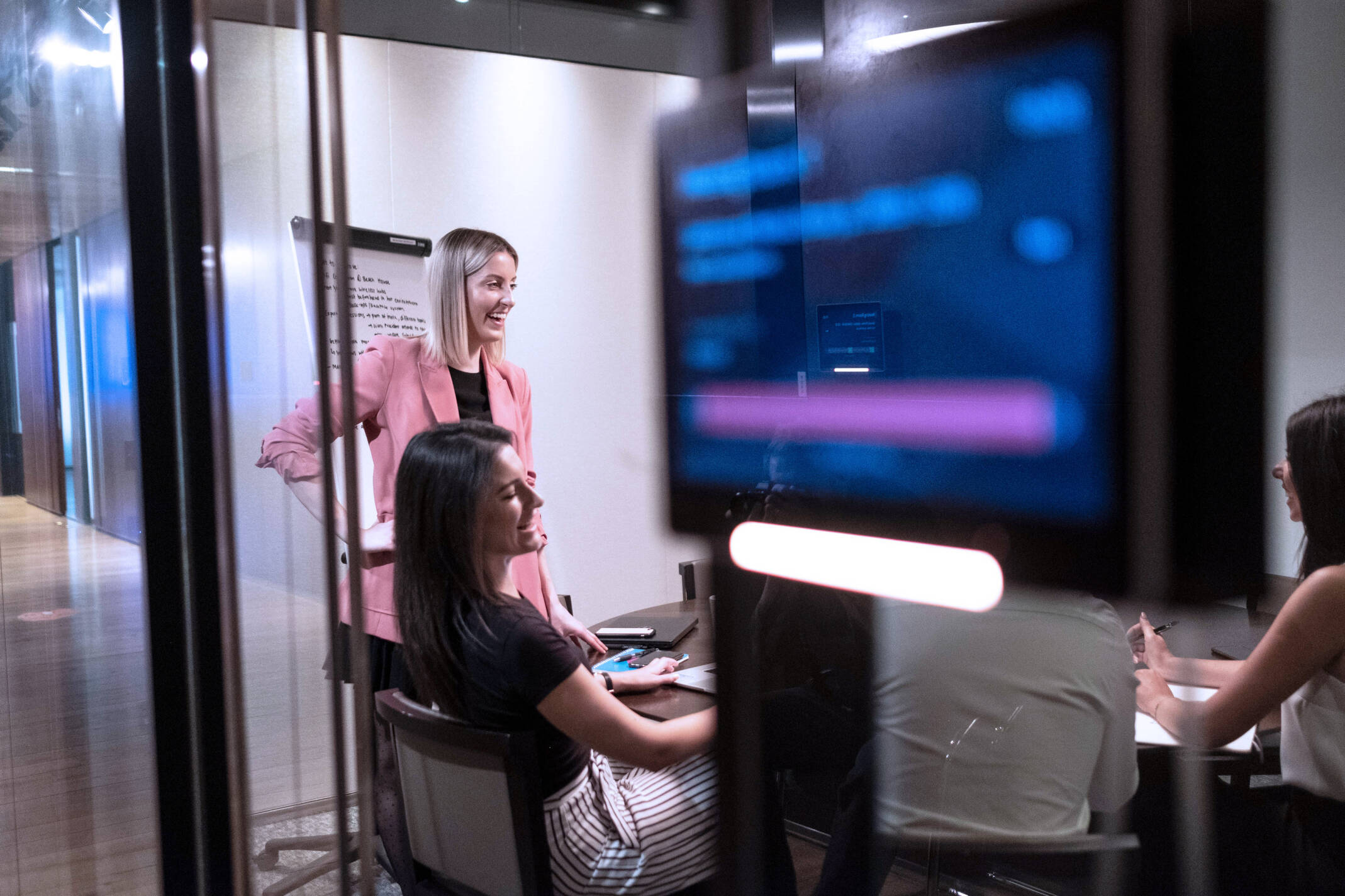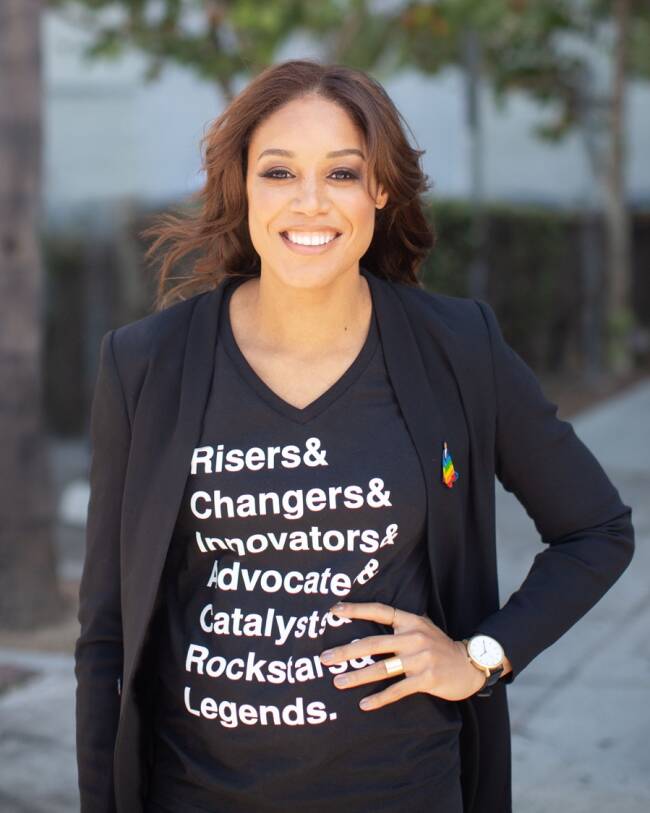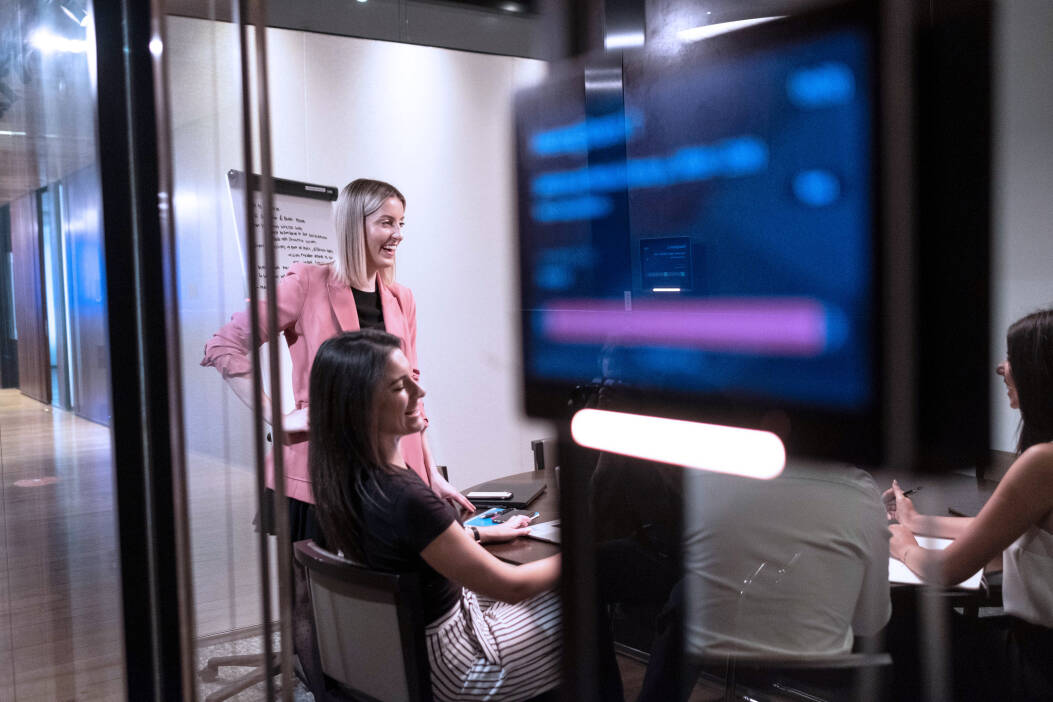
We can all be champions
Swimming against the tides

A Word From Christena

Back to main
In her 1982 address, Learning from the 60s, writer and civil rights activist, Audre Lorde poignantly said, "there is no such thing as a single-issue struggle, because we do not lead single-issue lives. Our struggles are particular, but we are not alone."


Back to main

As a Black woman who identifies as LGBTQIA+, this quote has always resonated with me. Too often, I’ve felt like there was no place for "all of who I am." It was easier for people to compartmentalize my identity as Black, a woman, and queer, rather than understand how the overlapping and compounding weight of my intersectional identity has shaped my world view.
Intersectionality places the onus on all of us to learn and unlearn, question false narratives that outpace the truth, and understand how we are both "insiders" and "outsiders" of particular struggles. When practiced correctly, intersectionality can be the great equalizer – surfacing unconscious bias, building allyship and creating an inclusive environment where there is a place for "all of someone." And, that is what we set out to do at dentsu.
In August 2020, I joined dentsu as the first Chief Equity Officer. There is no question that I joined at a critical time for the company, the industry at large, and at a time of tremendous unrest and uncertainty. At dentsu, we were in the midst of a herculean effort: to move from 160 brands to six brands for a more simplified client experience, redefining our brand mission to place growth and good on equal footing and renewing our employee promise to create a more inclusive culture. 2020 was also a year of reckoning for the ad industry, which has prioritized and deprioritized communities and issues, faced stops and starts, progress and regression, and placed a hyper focus on issues without addressing intersectional implications. And of course, the magnitude of COVID-19, a divisive political climate and the racial injustice uprising further exacerbated our people’s sense of identity and belonging.
But even in a moment as challenging as this one — especially in a moment like this one — our leadership team was committed to leading the way by building and modeling an equitable culture that our people, clients and partners could be proud of. We set out to architect a diversity, equity and inclusion practice that would permeate all business functions, client services and capabilities, employee experiences, partnerships and social impact initiatives.
This complete overhaul would need to go deeper than demographic data, but rather investigate whether our "inclusion infrastructure" was helping or hindering our progress.
As a creative and media leader, dentsu's influence to affect change and shape behaviors was not lost on us. We also pushed ourselves and our clients to think of every brief as a window or a mirror. A window would create shared understanding with a view into someone else’s experience and a mirror would allow people to see their own unique stories reflected back at them.
Despite the race to focus on race in the ad industry, we did not want to lose sight of the progress needed across all axes of identity - ethnicity, race, gender, sexuality, ability, cognitive diversity, religion, and other critical forms of identity are fundamental to creating an inclusive, equitable culture. So, we hold ourselves accountable to four key pillars, viewed through the lens of intersectionality: transparency and accountability, representation and sponsorship, education and continuous learning and; client and community impact.
In this inaugural Diversity, Equity and Inclusion Report, we guide you through our equity programs, policies and progress, both within dentsu and the industry at large. While there is more work to be done, we are proud of the progress that we’ve made so far in collaboration with our people, clients and partners. And we are proud of the recognition of our comprehensive efforts through two recent awards from the AAF Mosaic and Microsoft.
A heartful thank you to our Business Resource Groups who have pushed us to surface inconvenient truths, lean into the uncomfortable and emerge stronger. I extend my gratitude to our clients and partners, who have been part of our journey to create a more inclusive dentsu and media landscape. And, to our entire dentsu leadership team – notably Jacki Kelley, CEO dentsu Americas and Wendy Clark, CEO dentsu International – thank you for leading with fortitude, activating your networks for progressive change and helping to make our collective vision for a better dentsu a reality.

The lifeblood of the advertising industry will be diversity. We have an outsized impact on culture and therefore a greater responsibility to be truth tellers, and better storytellers, to introduce new narratives and accurate portrayals of people, developed and delivered by new voices at every stage of the process and at every level. From our regular pulse on consumer needs, behaviors and challenges, we see that more is expected from brands. 81% of consumers say media plays a critical role in shaping gender roles and 70% of consumers are more likely to support brands that respond to social injustice. We have to get this right - for the future of our business, for the benefit of future generations and to stay relevant to an increasingly conscious consumer base.
Our vision is a world where we can all be champions of progress, and a place where we can acknowledge that despite our particular struggles, we can emerge as equals. Without intersectionality, we will continue to find ourselves in a place where activity is confused for progress. In 2020, we set a strong foundation for cultural fluency and intersectionality and in 2021 we move forward to drive further impact and change.

We can all be champions
A Word From Christena
In her 1982 address, Learning from the 60s, writer and civil rights activist, Audre Lorde poignantly said, "there is no such thing as a single-issue struggle, because we do not lead single-issue lives. Our struggles are particular, but we are not alone."
Christena Pyle
As a Black woman who identifies as LGBTQIA+, this quote has always resonated with me. Too often, I’ve felt like there was no place for "all of who I am." It was easier for people to compartmentalize my identity as Black, a woman, and queer, rather than understand how the overlapping and compounding weight of my intersectional identity has shaped my world view.
Intersectionality places the onus on all of us to learn and unlearn, question false narratives that outpace the truth, and understand how we are both "insiders" and "outsiders" of particular struggles. When practiced correctly, intersectionality can be the great equalizer – surfacing unconscious bias, building allyship and creating an inclusive environment where there is a place for "all of someone." And, that is what we set out to do at dentsu.

Back to main

Swimming against the tides

In August 2020, I joined dentsu as the first Chief Equity Officer. There is no question that I joined at a critical time for the company, the industry at large, and at a time of tremendous unrest and uncertainty. At dentsu, we were in the midst of a herculean effort: to move from 160 brands to six brands for a more simplified client experience, redefining our brand mission to place growth and good on equal footing and renewing our employee promise to create a more inclusive culture. 2020 was also a year of reckoning for the ad industry, which has prioritized and deprioritized communities and issues, faced stops and starts, progress and regression, and placed a hyper focus on issues without addressing intersectional implications. And of course, the magnitude of COVID-19, a divisive political climate and the racial injustice uprising further exacerbated our people’s sense of identity and belonging.
But even in a moment as challenging as this one — especially in a moment like this one — our leadership team was committed to leading the way by building and modeling an equitable culture that our people, clients and partners could be proud of. We set out to architect a diversity, equity and inclusion practice that would permeate all business functions, client services and capabilities, employee experiences, partnerships and social impact initiatives.
This complete overhaul would need to go deeper than demographic data, but rather investigate whether our "inclusion infrastructure" was helping or hindering our progress.
As a creative and media leader, dentsu's influence to affect change and shape behaviors was not lost on us. We also pushed ourselves and our clients to think of every brief as a window or a mirror. A window would create shared understanding with a view into someone else’s experience and a mirror would allow people to see their own unique stories reflected back at them.
Despite the race to focus on race in the ad industry, we did not want to lose sight of the progress needed across all axes of identity - ethnicity, race, gender, sexuality, ability, cognitive diversity, religion, and other critical forms of identity are fundamental to creating an inclusive, equitable culture. So, we hold ourselves accountable to four key pillars, viewed through the lens of intersectionality: transparency and accountability, representation and sponsorship, education and continuous learning and; client and community impact.
In this inaugural Diversity, Equity and Inclusion Report, we guide you through our equity programs, policies and progress, both within dentsu and the industry at large. While there is more work to be done, we are proud of the progress that we’ve made so far in collaboration with our people, clients and partners. And we are proud of the recognition of our comprehensive efforts through two recent awards from the AAF Mosaic and Microsoft.
A heartful thank you to our Business Resource Groups who have pushed us to surface inconvenient truths, lean into the uncomfortable and emerge stronger. I extend my gratitude to our clients and partners, who have been part of our journey to create a more inclusive dentsu and media landscape. And, to our entire dentsu leadership team – notably Jacki Kelley, CEO dentsu Americas and Wendy Clark, CEO dentsu International – thank you for leading with fortitude, activating your networks for progressive change and helping to make our collective vision for a better dentsu a reality.

The lifeblood of the advertising industry will be diversity. We have an outsized impact on culture and therefore a greater responsibility to be truth tellers, and better storytellers, to introduce new narratives and accurate portrayals of people, developed and delivered by new voices at every stage of the process and at every level. From our regular pulse on consumer needs, behaviors and challenges, we see that more is expected from brands. 81% of consumers say media plays a critical role in shaping gender roles and 70% of consumers are more likely to support brands that respond to social injustice. We have to get this right - for the future of our business, for the benefit of future generations and to stay relevant to an increasingly conscious consumer base.
Our vision is a world where we can all be champions of progress, and a place where we can acknowledge that despite our particular struggles, we can emerge as equals. Without intersectionality, we will continue to find ourselves in a place where activity is confused for progress. In 2020, we set a strong foundation for cultural fluency and intersectionality and in 2021 we move forward to drive further impact and change.